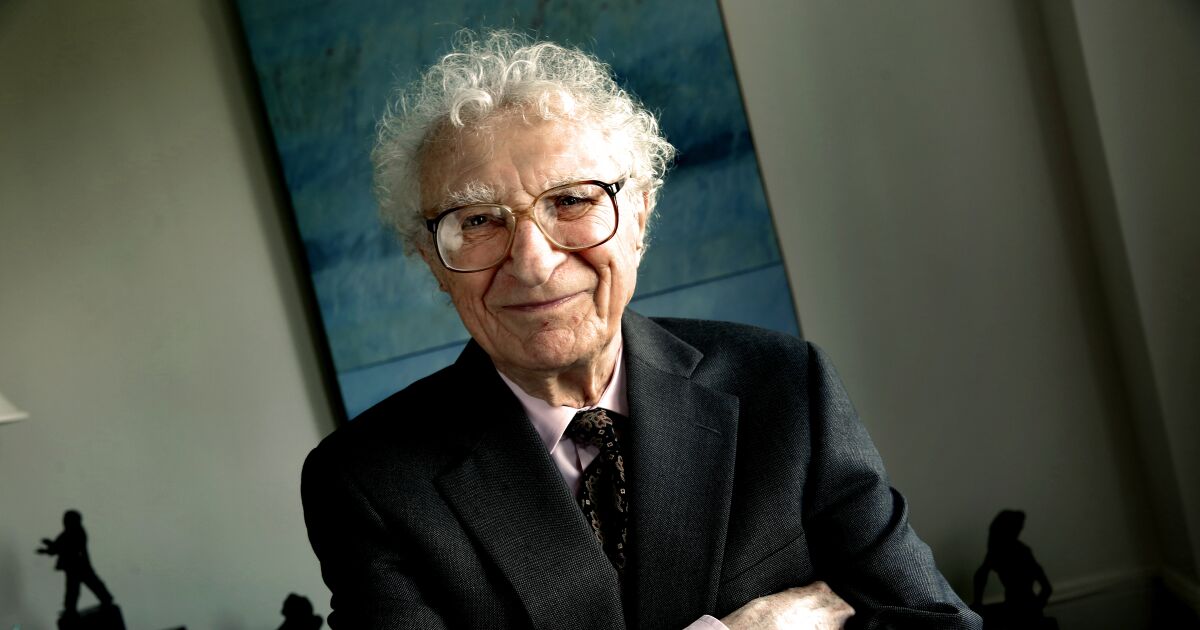
In 2016, when the prolific, award-winning Broadway lyricist Sheldon Harnick was 92, I asked him if he knew the secret to his longevity. “No,” replied the man who brought us the lyrics to such beloved musicals as “Fiddler on the Roof,” “Fiorello!” and “She Loves Me.” “But I’m grateful for it.”
While many of us assumed he just might live forever, Harnick died Friday morning at age 99 of natural causes, reported his publicist Sean Katz, at his longtime apartment on New York’s Upper West Side.
Harnick long lived on Central Park West, where his sunlit living room hosted several paintings by his wife of 58 years, artist and photographer Margery Gray Harnick, as well as gorgeous views.
I first spoke with Harnick when I wrote an article for The Times about “Fiddler on the Roof” in 2002, but I got to know him best when I wrote a book about the show in 2014. He was warm, welcoming, very amusing and his memory was razor sharp.
The child of parents born in Eastern Europe, Harnick grew up on the northwest side of Chicago, playing the violin and thinking he would become a violinist. But after going to Northwestern University, where he seriously studied violin, he was also seriously drawn to writing for the school’s lavish student revues, and “by the time I graduated, I knew my heart was with the theater, not the violin.”
Actually, he probably knew it even before college. His mother “celebrated every occasion with a poem,” he once told me. And pretty soon, he too was writing poems, then song lyrics, sketches and parodies in high school and college. Later, in the army, he would write songs and sketches to entertain the troops.
Harnick’s first show with Joseph Stein and Jerry Bock was 1958’s “The Body Beautiful,” which ran just six weeks on Broadway — Harnick liked to quip that it would have run seven weeks but there was a blizzard—but its score impressed producer/director Harold Prince. It indirectly led to 1959’s “Fiorello!”, the musical tale of New York Mayor Fiorello La Guardia, which Prince co-produced with a score by Bock and Harnick and a book by writers Jerome Weidman and George Abbott; it went on to win the Pulitzer Prize for Drama. Bock and Harnick wrote seven Broadway scores together, including “She Loves Me” in 1963 and “The Apple Tree” in 1966.
While nearly all of Harnick and Bock’s shows have done well over the years, their biggest hit was “Fiddler.” It opened on Broadway on Sept. 22, 1964. While its first review, from noted critic Walter Kerr, wasn’t very good, it hardly mattered. The next day, there were lines around the block, and nearly eight years and 3,300 performances later, it became the longest-running show on Broadway at the time. It won nine Tony Awards, including best musical, and was still on Broadway when United Artists released Norman Jewison’s film of the same name in 1971. There have been stage productions all over the world, as well as in thousands of schools, community centers and regional theaters.
Harnick was also very organized, lucky for me. He kept all the lyrics for “Fiddler on the Roof” in a thick pale-blue three-ring binder, and after going off to another room to get it during our interview, he started calling out titles for songs going back to 1961, and laughing aloud at some of them.
Consider Fiddler’s first song, originally called “We’ve Never Missed a Sabbath Yet.” Its first opening lines were about getting ready for the Sabbath — cleaning the house, plucking the chicken for supper and such. It eventually became “Tradition,” one of musical theater’s best-known songs.
Harnick, Bock and Stein had written nearly a complete show before meeting with director Jerome Robbins, Harnick once told me, and Robbins kept asking them what the show was about. “We would say it’s about this dairy man and his daughters,” Harnick told me, until finally Harnick said, “It’s about tradition.” Robbins replied, “That’s it. Write that.”
So they did. Other songs, too, came and went. There was a discarded song written for the butcher, and another, also discarded, for Motel the tailor, called “Dear Sweet Sewing Machine,” which featured the tailor’s promise to love, honor and keep polished his new sewing machine.
Harnick would write lyrics on hotel stationery, scraps of paper and simply in his head. One time he was concentrating so hard on putting lyrics to a melody that Bock had written, he stepped right in front of a truck. “The driver slammed on the brakes and honked his horn,”Harnick told me. “I looked up, startled and then kept right on walking, working on the song. Jerry told me to be more careful.”
Barbara Isenberg is a former Times staff writer and the author of “Tradition! The Highly Improbable, Ultimately Triumphant Broadway-to-Hollywood Story of ‘Fiddler on the Roof,’ the World’s Most Beloved Musical.”












